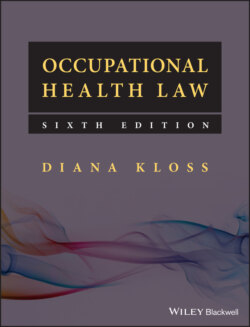Читать книгу Occupational Health Law - Diana Kloss - Страница 34
The disability employment gap
ОглавлениеLess than half of disabled people are in employment (48 per cent) compared with 80 per cent of the non‐disabled population. 4.6 million disabled people and people with long‐term health conditions are out of work. People who are unemployed have higher rates of mortality and a lower quality of life.
In a Green Paper published in 2016: Improving Lives the Department of Work and Pensions and the Department of Health and Social Care initiated consultation on how to achieve their ambition of halving the disability employment gap. Its wide‐ranging proposals covered health services, welfare provision, and the role of employers, and included the provision of better occupational health support. An important development was the suggestion that models of integrating occupational health within NHS primary and secondary care services provision could be explored, re‐orientating a part of the NHS occupational health workforce to provide patient services directly. ‘Potentially it may also be possible to expand availability of occupational health, at least for people with more complex needs who do not have occupational health provided by their employer, are self‐employed, or are out of work’.
The projected White Paper following the consultation did not appear. Instead, the government published its reply as a policy paper: Improving lives: the future of work, health and disability (2017). It took the opportunity also to reply to Thriving at work: the Stevenson/Farmer Review of mental health and employers (Department for Work and Pensions, 2017) and Good Work: the Taylor Review of Modern Working Practices (Department for Business, Energy and Industrial Strategy, 2017). As regards occupational health, it stated that evidence showed that effective OH provision can help protect and promote employee health and wellbeing, and prevent unnecessary sickness absence long‐term, but that the current model of OH provision did not meet the needs of employers or individuals. An Expert Working Group on occupational health was set up to advise on reform and research was commissioned to understand better the current market supply and delivery structures of OH provision and its operation. The feasibility of integrating OH into primary care pathways was explored, in particular with Greater Manchester Combined Authority and the Scottish Government. In 2019 the Work and Health Unit began discussions on proposals for reform in Health is everyone’s business (above).
